Device projects holographic images into brain to activate dozens of neurons at once, simulating real patterns of activity that fool the brain into perceiving things that aren’t there.
Category: neuroscience – Page 803
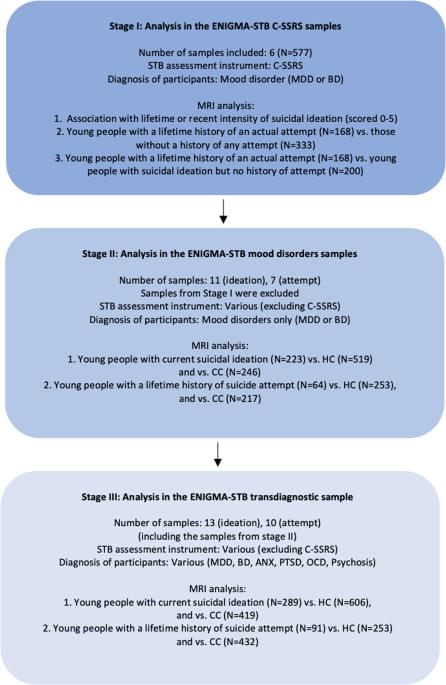
Structural brain alterations associated with suicidal thoughts and behaviors in young people: results from 21 international studies from the ENIGMA Suicidal Thoughts and Behaviours consortium
Suicide is the second leading cause of death for young people aged between 15 and 29 [1]. Suicidal thoughts and behaviors (STBs) typically emerge during adolescence [2]. It has been estimated that between 11 and 29% of adolescents report suicidal ideation (suicidal thoughts), and 2–10% of adolescents attempted suicide in the past year [3]. Unfortunately, the number of suicide attempts among children and adolescents has continued to increase sharply despite national and international prevention efforts [4].
To improve targeting of prevention and intervention efforts and thereby reduce the number of deaths by suicide in this age group, we must increase our understanding of the mechanisms underlying both suicidal thoughts and suicidal behaviors (including suicide attempts) in young people. Neuroimaging, including Magnetic Resonance Imaging (MRI), is a useful tool with which to identify biological risk markers for STBs in vivo and non-invasively. Many neuroimaging studies have been published examining the neural substrates of STBs in the past 20 years, but few have focused on STBs in youth (for a review, see [5]). Although several of these studies support lower regional brain volumes, particularly in ventral and dorsal prefrontal and also in temporal regions [6,7,8,9] in suicide attempters with mood disorders, negative findings have also been reported [10, 11].
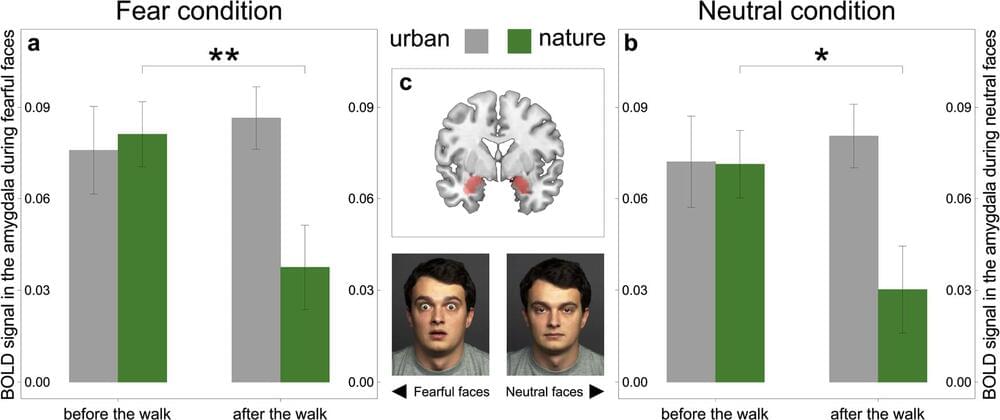
How does nature nurture the brain?
After a 60-minute walk in nature, activity in brain regions involved in stress processing decreases. This is the finding of a recent study by the Lise Meitner Group for Environmental Neuroscience at the Max Planck Institute for Human Development, published in Molecular Psychiatry.
Living in a city is a well-known risk factor for developing a mental disorder, while living close to nature is largely beneficial for mental health and the brain. A central brain region involved in stress processing, the amygdala, has been shown to be less activated during stress in people who live in rural areas, compared to those who live in cities, hinting at the potential benefits of nature. “But so far the hen-and-egg problem could not be disentangled, namely whether nature actually caused the effects in the brain or whether the particular individuals chose to live in rural or urban regions,” says Sonja Sudimac, predoctoral fellow in the Lise Meitner Group for Environmental Neuroscience and lead author of the study.
To achieve causal evidence, the researchers from the Lise Meitner Group for Environmental Neuroscience examined brain activity in regions involved in stress processing in 63 healthy volunteers before and after a one-hour walk in Grunewald forest or a shopping street with traffic in Berlin using functional magnetic resonance imaging (fMRI). The results of the study revealed that activity in the amygdala decreased after the walk in nature, suggesting that nature elicits beneficial effects on brain regions related to stress.
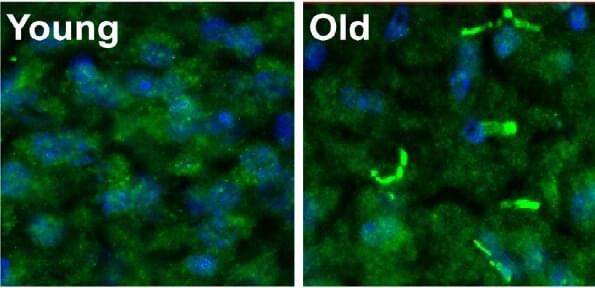
New study identifies how memory of personal interactions declines with age
One of the most upsetting aspects of age-related memory decline is not being able to remember the face that accompanies the name of a person you just talked with hours earlier. While researchers don’t understand why this dysfunction occurs, a new study conducted at University of Maryland School of Medicine (UMSOM) has provided some important new clues. The study was published on September 8 in Aging Cell.
Using aging mice, researchers have identified a new mechanism in neurons that causes memories associated with these social interactions to decline with age. In addition, they were able to reverse this memory loss in the lab.
The researchers report that their findings identified a specific target in the brain that may one day be used to develop therapies that could prevent or reverse memory loss due to typical aging. Aging memory problems are distinct from those caused by diseases like Alzheimer’s or dementia. At this time, there are no medications that can prevent or reverse cognitive decline due to typical aging.
Elon Musk’s NEURALINK vs Bryan Johnson’s KERNEL (No Surgery)
00:00 Intro.
02:44 Kernel Flow brain interface.
08:03 Seeing my brain activity.
12:42 Reversing aging-Project Blueprint.
18:18 Overcoming depression.
26:42 Starting Kernel.
34:40 Why non-invasive?
36:43 Comparison to Tesla/ Neuralink.
43:52 Elon considered joining Kernel?
44:52 Kernel hiring.
46:17 Participate in the studies.
Participate & experience Kernel Flow: https://www.kernel.com/participate.
Information: Kernel Flow: https://www.kernel.com/flow.
Kernel Careers: https://jobs.lever.co/kernel-2
Neura Pod Episode about Kernel & Bryan Johnson: https://youtu.be/c0VFiEhDg6I
Bryan Johnson LinkedIn: https://www.linkedin.com/in/bryanrjohnson/
Bryan Johnson Personal Page: https://www.bryanjohnson.co/
Blueprint Website: https://blueprint.bryanjohnson.co/
After selling his company, Braintree/Venmo, for $800 million and battling chronic depression for 10 years, Bryan Johnson is now on a mission to help us measure and gather more data about the organ that makes us oh-so human: our brain.
In this episode, Ryan Tanaka and Omar Olivares share an exclusive, behind the scenes look of Kernel’s headquarters near Los Angeles, California. Ryan interviews Bryan Johnson, tries on Kernel’s wearable brain-interface, ‘Flow,’ and learns about the engineering and technology developments needed to make it all happen. CTO, Ryan Field and Director of Applied Neuroscience, Katherine Perdue also share insights about Kernel’s wearable Flow headset.
Disclaimer: Thanks to Kernel for opening their office for us to film in and for supporting our travel and accommodation.
Neura Pod is a series covering topics related to Neuralink, Inc. Topics such as brain-machine interfaces, brain injuries, and artificial intelligence will be explored. Host Ryan Tanaka synthesizes informationopinions, and conducts interviews to easily learn about Neuralink and its future.

New Device Can Detect Alzheimer’s 17 Years in Advance
Before the first clinical symptoms appear, Alzheimer’s.
Alzheimer’s disease is a disease that attacks the brain, causing a decline in mental ability that worsens over time. It is the most common form of dementia and accounts for 60 to 80 percent of dementia cases. There is no current cure for Alzheimer’s disease, but there are medications that can help ease the symptoms.
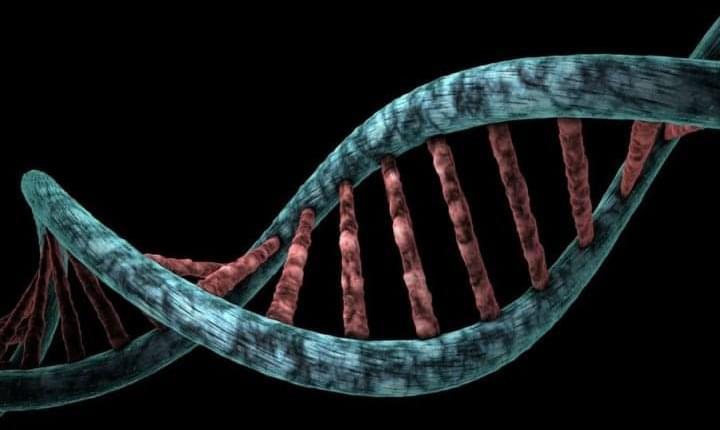
‘Jumping’ genes yield new clues to origins of neurodegenerative disease
The findings also point to possible directions for treatment of the disease.
The results are published Sept. 6 in the journal Neuron.
Almost half the human genome is comprised of transposable elements, long and short stretches of DNA called “jumping genes” for their ability to move from one location of the genome to others. Once called “junk” DNA, these transposable sequences have been shown to play crucial regulatory roles in many biological functions. Once they fulfill these myriad roles, molecular regulators usually silence their expression.
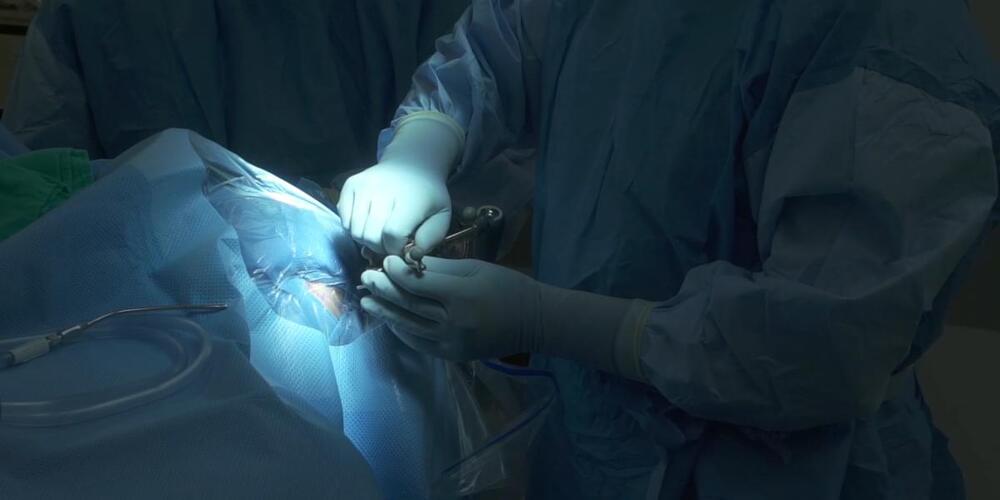
A memory prosthesis could restore memory in people with damaged brains
It works by copying what happens in the hippocampus—a seahorse-shaped region deep in the brain that plays a crucial role in memory. The brain structure not only helps us form short-term memories but also appears to direct memories to other regions for long-term storage.
For more than 10 years, Theodore Berger and Dong Song at the University of Southern California and their colleagues have been developing a way to mimic this process. Their idea is to use brain electrodes to understand the electrical patterns of activity that occur when memories are encoded, and then use those same electrodes to fire similar patterns of activity.
Martin Ciupa — AI Superintelligence, The Singularity & Neuralink
https://www.timventura.com — Martin Ciupa discusses the existential risks and unintended consequences of AI superintelligence and the Singularity, along with concerns about AI augmentation through Neuralink. We also explore the philosophical underpinnings of The Singularity and how it fulfills a long-standing human need for transcendence in a technologically advanced society.
Martin Ciupa is a subject matter expert on artificial intelligence. Martin is the CEO of Remoscope Inc, an AI-based Telehealth startup, and an advisor & consultant to Mindmaze, a Unicorn Neurotech company focuses on applying advanced neuroscience to everyday life. Martin has decades of experience in computing and artificial intelligence, PhD studies in AI, and a Master’s Degree in Cybernetics. He joins us today to discuss AI Superintelligence and the Singularity.
We previously touched on Ghosts in the Machine in terms of the human qualities we unintentionally build into AI, so today I wanted to focus on “God In The Machine”, especially in regards to AI Superintelligence and the Singularity. Let’s start with a story in Futurism quoting former Google Exec Mo Gawdat as saying that “AI Researchers are creating God”.
The Singularity has scared more than just this researcher: Stephen Hawking has said that “The development of full artificial intelligence could spell the end of the human race”. Bill Gates and Elon Musk have also voiced concerns on AI Superintelligence. Gates said, “I am one of those who is concerned about superintelligence. First, machines will do a lot of work for us and they won’t be super smart. That should be positive if we manage it well. A few decades after that, they will be smart enough to be a concern.” – and Elon Musk has said that development of artificial intelligence “is the greatest existential threat to humanity”.
We contrast these views against the optimistic view of AI Superintelligence by proponents like Ray Kurzweil, who has said, The pace of change will be so astonishingly quick that we won’t be able to keep up, unless we enhance our own intelligence by merging with the intelligent machines we are creating. What are your thoughts on the positive aspects of this technology?
Finally, speaking in practical terms, the world we live in is becoming increasingly automated and complex, and moving past the ability of people to manage all of these systems. We explore whether human-level or higher AI at some point simply to help run this machine-driven world we’re creating.
David Pearce and Andrés Gómez Emilsson Chat About the Nature of Reality
Along the way, they discuss the early days of David’s HedWeb, the Abolitionist Project, the Three Supers of Transhumanism (Superhappiness, Superintelligence, and Superlongevity), philosophy and history of science, the nature of intelligence, field theories of consciousness, anesthesia, empathogens, anti-tolerance drugs, and much more.
Some of the key essays discussed:
Utopian Pharmacology — “Mental Health in the Third Millennium — MDMA and Beyond” — https://mdma.net/
Future Opioids: The Quest for a Drug-Free Society — https://www.opioids.com/
The Biointelligence Explosion — “How recursively self-improving organic robots will modify their own source code and bootstrap our way to full-spectrum superintelligence” — https://www.biointelligence-explosion.com/